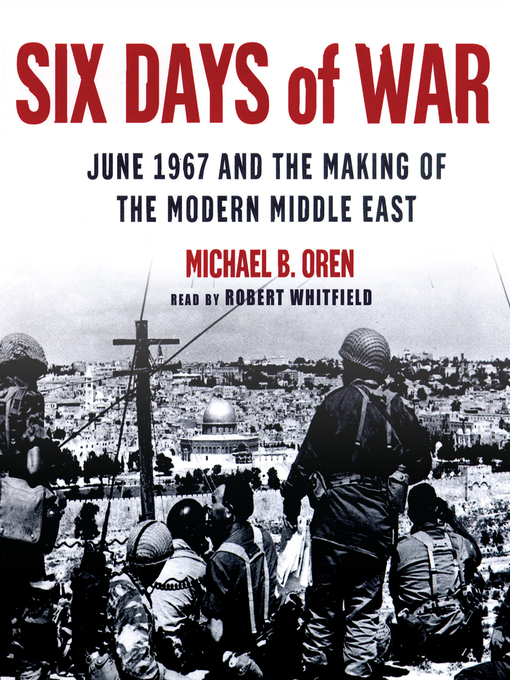
By: Brian Freeman
Michael Oren’s Six Days of War June 1967 and the Making of the Modern Middle East is a riveting account and thoroughgoing analysis of the events leading up to the Six Days War. In his work, Oren skillfully captures the geographic, social, cultural, and political effect the war had on the Middle East. Six Days of War June 1967 and the Making of the Modern Middle East is arguably one of the most comprehensive history books ever published on the Six Day War. Oren provides incredible details, offering background information for the causes and the major political leaders. Oren draws from a number of American, Russian, and Israeli archives, along with Syrian and Jordanian sources to provide political insight into the thoughts and actions of most of the major players before, during, and after the war. In some instances, Oren uses these sources to give an hour-by-hour description of events during the war. Unfortunately, however, Oren’s use of detail causes the book to become dry and boring descriptions of battles and battlefield decisions in some places.
In the first four chapters, Oren explains the roots of Zionism and sets the stage for the war in terms of culture, politics, and religion. Oren main argument is that the Six Day war is about water rather than Jewish state. Oren presents solid evidence that the Arab states, in a gross miscalculation, ratcheted pressure to the point where Israel was forced to act preemptively in order to assure its survival. Oren made extensive use of sources to give insight to what the major actors were thinking during the entire saga. Each of the figures that play a significant role in the coming conflict is described in great detail. Oren allows us to see both their flaws and their courage, regardless of which side they were on. Most important, however, is that historical facts are marshaled effectively in between the political intrigue of the situation.
One of the most interesting parts of the book is the dynamic relationship between the United States and Israel. Oren chronicles Israel's political struggle with the United States and the Soviet Union to permit an appropriate military response to Egypt's provocations. Israeli leaders then as now, tried to strike balances between competing pressures and goals, while attaining both security and international approval, and showing willingness for peace without appearing militarily weak. The strength of Israel’s military was best exemplified by the fact that even though the Soviet influence was extremely powerful in the Middle East region, the Muslim leaders could not join together to defeat the Israeli threat. The Israeli victory in the Six Day War contained an amazingly high number of fateful decisions, meticulous planning, and overall dumb luck. The dumb luck of Israel was the absence of unity among the Arab nations and the fact that the Arab troops were completely unprepared. The tactical atrocities of Syria that involve the refusal to send in reinforcements still remain unexplained, however.
One of the most ironic sections of the book involves the Arab lies about how the war was being won. Arab media was reporting to the people that the Arab armies were smashing the Israelis even as those armies were being pummeled into near non-existence. Once the truth was finally revealed, people’s disappointment grew and became even more tragic and difficult to take. Oren’s crowing achievement is the use of massive detail explaining the Israel battle strategy and political thought. Covering the battles minute by minute and with Oren commentary is one of the most interesting parts of the book. Oren is able to capture the incredible one-sided victory and comment that even Israel's generals found it difficult to believe it was happening. Israel, having proved it could not be defeated militarily as well as possessing something to trade, hoped for comprehensive peace. Tragically, that peace would never be found though. The Israeli victory of the Six Days War would have massive implications for creation of the modern tensions of the Middle East
Oren’s extraordinary research provides him with the ability to give detailed descriptions of all the participants. The Arabs, Israelis, Soviets, and Americans make the Six Days of War June 1967 and the Making of the Modern Middle East an essential reading for anyone seeking to understand the history of the troubled region. Oren’s detailed storytelling of how the war broke out and the shocking ways it unfolded make it a compelling read. On the other hand, because of Oren’s use of intense detail, the pace of the book slows down considerably. Oren makes up for this however, by tracing the military course of the war and its political aftermath, including lingering tensions in the Middle East. The Six Day War was in many ways the most pivotal event for the creation of the modern Middle East, and Oren’s narrative storytelling truly captures the event. Ultimately, Six Days of War June 1967 and the Making of the Modern Middle East paints a fascinating portrait of the war that still dictates Mid-East negotiations.
Oren, Michael. Six Days of War June 1967 and the Making of the Modern Middle East. New York: Oxford University Press, 2002.





0 comments:
Post a Comment